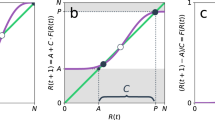Abstract
In this paper, we extend Granovetter’s classic threshold model by adding both utility and psychological threshold. We conduct simulations with the presented model while also considering the spatial factor and friendship influence strength. We observe that the equilibrium of collective dynamics is not closely related to the friendship impact. With no utility and psychological threshold, the equilibrium state of the model is sensitive to the fluctuation of the collective threshold distribution and displays critical phenomena. By comparison, the equilibrium state with considering utility and psychological threshold looks positively robust. Furthermore, we observe that both cases demonstrate group bi-polarization pattern with the increase of standard deviation of the threshold.
Access this chapter
Tax calculation will be finalised at checkout
Purchases are for personal use only
Preview
Unable to display preview. Download preview PDF.
Similar content being viewed by others
References
Roger, E.M.: Diffusion of Innovations, 3rd edn. Free Press, New York (1983)
Granovetter, M., Soong, R.: Threshold Models of Diffusion and Collective Behavior. Journal of Mathematical Sociology 9, 165–179 (1983)
Bass, F.M.: A new product growth model for consumer durables. Management Science 15, 215–227 (1969)
Galam, S., Moscovici, S.: Towards a theory of collective phenomena: Consensus and attitude changes in groups. European Journal of Social Psychology 21, 49–74 (1991)
Granovetter, M.S.: Threshold models of collective behavior. American Journal of Sociology 83, 1420–1443 (1978)
Kahneman, D., Amos, T.: Prospect Theory: An Analysis of Decision under Risk. Econometrica XLVII, 263–291 (1979)
Lopez-Pintado, D., Watts, D.J.: Social influence, binary decisions and collective dynamics. Rationality and Society 20(399), 797–817 (2008)
March, J.G., Simon, H.A.: Organizations. Wiley, New York (1958)
Macy, M.W., Flache, A.: Learning dynamics in social dilemmas. Proc. Nat. Acad. Sci. 99(3), 7229–7236 (2002)
Galam, S.: Local dynamics vs. social mechanisms: A unifying frame. Europhysics Letters 70, 705–711 (2005)
Author information
Authors and Affiliations
Editor information
Editors and Affiliations
Rights and permissions
Copyright information
© 2012 Springer-Verlag Berlin Heidelberg
About this paper
Cite this paper
Li, Z., Tang, X. (2012). A Study of Collective Action Threshold Model Based on Utility and Psychological Theories. In: Huang, R., Ghorbani, A.A., Pasi, G., Yamaguchi, T., Yen, N.Y., Jin, B. (eds) Active Media Technology. AMT 2012. Lecture Notes in Computer Science, vol 7669. Springer, Berlin, Heidelberg. https://doi.org/10.1007/978-3-642-35236-2_47
Download citation
DOI: https://doi.org/10.1007/978-3-642-35236-2_47
Publisher Name: Springer, Berlin, Heidelberg
Print ISBN: 978-3-642-35235-5
Online ISBN: 978-3-642-35236-2
eBook Packages: Computer ScienceComputer Science (R0)




